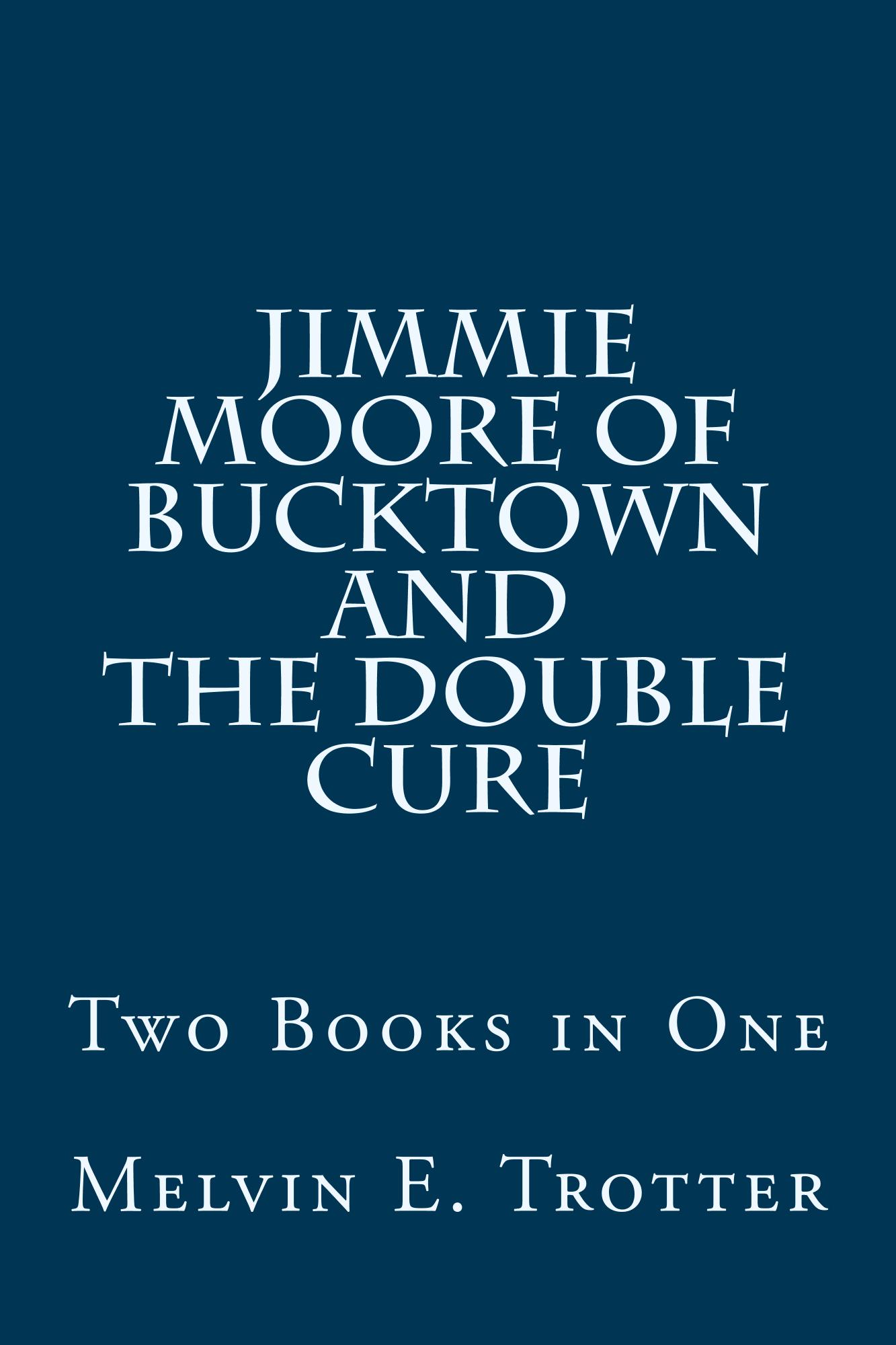Description
JIMMIE MOORE OF BUCKTOWN
and
The Double Cure
by
Melvin E. Trotter
2016
Contents
Preface 5
I. The Invasion Begun 7
II. “Der Gang” 16
III. “The Busted Funeral” 27
IV. Jimmie’s New Pa 32
V. Mrs. Cook’s “Opery” 38
VI. Mrs. Cook’s First Prayer 43
VII. Floe 48
VIII. Bill’s Pension 57
IX. “Auntie’s Favorite Horse” 63
X. Jimmie’s Education 71
XI. The Meeting in the Market 76
XII. Fred Hanks 84
XIII. “Fagin’s Meetin’ ” 93
XIV. Fred and Doc 100
XV. The Picnic 107
XVI. Dave Strikes His Gait 114
THE DOUBLE CURE 117
Preface
In presenting the first edition of Jimmie Moore to the public, neither author nor publisher considered it necessary to offer a preface, but the book has excited so much interest and there have been so many inquiries as to whether it is truth or fiction, it is considered advisable to state that it is a true story and that all the characters here represented, though six years ago considered hopeless outcasts, are to-day prosperous, happy, contented citizens of Grand Rapids and are living, breathing examples of the transforming power of Jesus Christ, with the glad story of Redemption on their lips every day. The transformation of Bucktown is civic history and the work in that locality has spread to every other locality in this city. Districts that were given over to drunkenness and fights and that were dependent upon benevolent organizations for existence are to-day self-supporting.
Surely the day of miracles is not past.
Melvin E. Trotter.
City Rescue Mission,
Grand Rapids, Mich.
December 15, 1904.
The Invasion Begun
I. The Invasion Begun
“Please kin yer tell me where is der boss of dis Mishun?”
The superintendent turned sharply about and beheld a boy of singularly striking appearance. His stature was that of a child of ten or twelve years and his face that of a worn-out, heartbroken, disappointed old man. His eyes, set far back in his head under heavy eyebrows, indicated an almost abnormal development of the perceptive faculties. In other respects the contour of the head was not remarkable; but the face was one, once seen, never to be forgotten. The nose was pointed and pinched, the cheeks hollow, and the glance of his eye at once appealing and defiant. There could be no doubt that this boy was a bread winner, and that the burdens he carried were altogether too heavy for such young shoulders.
From the ragged cap which he turned nervously in his hands to the large pair of sharp-pointed ladies’ shoes on his feet, every garment was a misfit. The loss of a button from the neckband of his blouse-waist permitted it to gap wide open and disclosed the fact that he wore no underclothing. The day was bitterly cold; and the boy’s shivery look showed how greatly he suffered.
As the superintendent took in all these facts he realized that, despite his unseemly attire and generally distracted appearance, the boy was by no means an ordinary character. Down deep in the dark gray eyes that never wavered under his steady gaze he saw the making of a man mighty for good or evil.
“I guess I’m the man you want,” said Morton, kindly. “Come into my office.”
“The burdens he carried were altogether too heavy for such a young shoulders”.
Leading the way, he was followed by the boy into a small private office at the back end of the big mission hall. Offering the lad a seat, he turned to his desk, on which stood two telephones. In an instant that boy was again upon his feet. Looking with wide-open eyes, he inquired, “Be yer goin’ ter call der bull? I ain’t as’t yer fur nuthin’. Me Pa said yer was a good guy and wouldn’t squeal. I mus’ go.”
Morton intercepted the boy at the door. But it was some time before he could persuade him that it was not his intention to turn him over to the police, “the bull,” for begging.
“I want to help you,” he said. “I’ll be your friend, and I won’t squeal on you either.”
“Well, be yer Mister Morton?” asked the boy.
“Yes, that’s my name,” replied the superintendent. “And now I want you to tell me all about your trouble. Who sent you to me?”
“Me Pa. He heard yer talk on der gospel wagon down at der square. He don’t talk about nuthin’ else and he wants yer ter come an’ see him.”
“Is he side?”
“Sure he’s sick. He’s been in bed ever since Wednesday. Ma says he’s outer his head. Tuesday night he didn’t come home from work, and Ma says, ‘I guess he’s drunk ag’in.’ We waited fur him till eleven o’clock and den I couldn’t stay awake no longer. ’Sides, der wood was all burnt up and we had ter go ter bed ter keep warm. At five in der mornin’ Mike Hardy, der bar-keep’ at Fagin’s, saw Pa layin’ in Rice’s wagon box, out in front of der market. It snowed on Pa, and he was near frozed. Mike calls Bill Cook and dey brings Pa home. Bill and Pa is chums; an’ Bill gets drunk, too. Ma says dey bot’ works fur Fagin. When dey gits paid dey take all der money straight to Fagin’s and spends it for booze.”
“Well, what’s your name and where do you live?” interrupted Morton.
“Me name’s Jimmie Moore, and we live down in Bucktown near der market.”
“Go on with your story, sonny,” said Morton.
“After dey got him in der house Ma and Bill gits his clothes off and Bill goes and gets some wood and built a fire. I carried me momin’ papers, and when I gits back I stayed wit’ Pa while Ma went ter Ransome’s house up on der Avenue to do deir washin’. Pa he slept all day till four in the afternoon, and den he raised up straight in bed and, lookin’ at somethin’ in der corner of der room, said, ‘Can’t yer see me hand? I raised it twice. Why don’t yer come and git me?’ I couldn’t see nuthin’, but he keeps on talkin’ dat way fur a long time. Den he laid down again and cried and said he wanted der mishun man ter come and see him. When Ma gits back she sent me to der barber shop to git Fred Hanks ter telerphone ter Dr. Possum. He’s der city doctor. He looked at Pa and said he had ammonia. Den Ma she cried, ’cause she had no money ter git supper for us kids and fer the doctor’s paper, too.
“Pretty soon Mrs. Cook, that’s Bill’s missus, comes in and she said she’d help take care of Pa. The neighbors done all dey could, but we ain’t got no money, er no wood, and der rent ain’t paid. We ain’t had no fire since yisterday, and dis momin’ Ma sits down and cries ’cause der’s nothin’ for der kids ter eat. Her and me don’t mind, but we got four girl kids that’s hungry all der time. Pa set up in bed and said, ‘Go to der mishun man and tell him I mus’ see him.’ Ma sent me up ter see if yer won’t come down ter see Pa.”
Finding a knitted scarf for the boy to tie about his neck, the superintendent and Jimmie started for the sick man’s bedside. The section of the city where the Moore family lived, locally known as Bucktown, contained the only real slums to be found in the busy and rapidly growing metropolis. It was located on a low tract of ground between the city market and the river, and was inhabited chiefly by negroes and very poor white people.
On the way Jimmie continued his story, and the superintendent tried to tell him about the Father above who loves the poor and who sent His Son to die that all the world might live and have access to the unsearchable riches of God. “The only help that is sure and lasting” he said, “comes from God. He can find a way out of your trouble for you.”
“I don’t see how He kin help us,” replied the boy. “They won’t give us no help at der city hall, ’cause we ain’t been here long enough. We ain’t no city case er nothin’ else, I guess. The man said he would put us kids in der Children’s Home and Pa in der poorhouse, er send us all back ter Dalton. Ma said she’d die widout us kids.”
When the boy stopped talking Morton took him by the hand and told him about the Jesus who loves little boys and their fathers and mothers, and how He would do all things for them. “If you believe in Him,” said the superintendent, “you can ask for anything in His name and get it.”
“Where is Jesus?” asked Jimmie.
“He’s right here now,” replied Morton. “You can’t see Him, but He’s always with us to watch over us and care for us.”
This was a stunner for Jimmie. For a full minute he looked straight ahead of him, as if in deep thought, and then raising his eyes until they met Morton’s, said: “Watcher givin’ us, Cully? Do yer tink I am bug-house?”
“No, I don’t think you’re crazy, but what I have said is true, Jimmie. You can’t see the wind, but you know there is wind because you feel it. I cannot see Jesus with my natural eye, but I know He is here, just as well as you know that the wind is blowing. I trust Him for everything, and He supplies all my needs, I have loved Him and He has kept me for seven years. I never help any one myself; I do it for Him. He gives me the love and the money, and if I help you, you must thank Him and not me.”
“Maybe He loves good boys; but I’m no good, ner never was. He can’t love no kid like me, kin he?”
“Yes, my boy, just as much as He does me.”
“Den He don’t know me, for everybody dat knows me says I’m bad. Me Ma, even she says so. I guess He don’t love no one in Bucktown.”
“Yes, He loves every one in Bucktown, and He will care for you all if you will trust Him and ask Him for what you need.”
“Kin I ask Him fur somethin’ ter eat;”
“Yes, you can, and you’ll get it too. But you must love Him and thank Him for what you get.”
Jimmie looked up to see if Morton really meant what he was saying. When he saw the look of intense earnestness on the superintendent’s face he knew that he was not deceiving him.
“I hope He’ll help Pa,” said Jimmie thoughtfully. “I guess he needs it mor’n der rest of us do.”
“If your Pa will tell God what a sinner he has been and will ask Him for forgiveness, He will help him. God is a friend of sinners, Jimmie.”
“This is where we live,” said the boy, turning to go into a miserable shack.
The house was one of the most disreputable looking places in the neighborhood. It consisted of a lean-to portion of a house from which the original building had been moved away. There was no wall beneath; the building stood on four posts, one at each corner, and open on all sides, the wind having a clean sweep beneath the floor in every direction. Within there were two rooms. In the front one was a bed upon which the sick man lay, an old table, two chairs and a box to sit on. In the next room an old wood-burning cook-stove, a big box for table and cupboard combined, and a broken mirror constituted its complete furnishing. The roof leaked, and most of the spaces in the window sashes were filled with rags and paper instead of glass.
A baby of six months, lying in a market basket, was being pulled about the room by an older sister. When Morton entered, two other girls, older than the baby, one two, the other past three years of age, darted under the bed and peeked from beneath the ragged comfort hanging over the edge.
“Dis is Mister Morton from der Mission,” said Jimmie proudly, still clasping the hand of the superintendent, “and he says dat Jesus loves every bloomin’ one of us, and’II be our friend and owns the whole business. If we lives fur Him, He lives fur us, and – and – ”
“You shut up, Jim,” said his mother, as with her apron she wiped the dirt off the seat of the nearest chair.
“Sit down, Mister Morton,” she said. “Glad to see you. We ain’t got much of a place here; but Robert wanted to see you so bad, I sent Jimmie up to the Mission to bring you.”
After greeting the little ones, Morton went to the bed and spoke to Mr. Moore. He was sick indeed; and the superintendent knew that he was facing a man who would never stand upon his feet again.
Oh, sir,” said the sick man, “I’m dying, and I’m not saved. I know I’m not fit to go, and I don’t know the way to git fit. I heard you talk on the gospel wagon and I’ve tried to find God by myself, but I don’t seem to get any answer to my prayers. Back in Pennsylvania, at a meeting in our little country schoolhouse, I promised God I would live for Him, but after we was married I came out West, and settled in this country when it was wild. Maybe you know how it is. I learned to drink, and that has spoiled all my chances. Since I’ve been sick here I’ve seen it all over again, and I want God to save me before I die. I know I’ve been awful wicked, but I heard you say God loved everybody; now I want you to pray for me.”
Moore broke into tears as he thought of his awful sin, and he was weeping bitterly. The superintendent read the third chapter of John slowly and with emphasis, and told of the marvelous love of God that makes the way for the salvation of even the most unworthy. The man said he was ready to give up, but wanted first to confess his wickedness. The story of his life was one of toil and privation. He had learned to drink after he became a man and had a family. From that time on his descent was rapid. He made no attempt to shield himself, but laid bare before the superintendent and before his own family all the secrets of his sinful career. He left his home at Dalton to escape arrest, and when times got hard in the city he feared to go back to his old home on account of the possible consequences of his sin.
When he had finished, the superintendent pointed him to the One who alone could help him. The sick man said he would believe and trust God. That little gathering, with the prayers that followed, was an experience that Morton will remember as one of the events of his life. The wife also expressed a desire to know the Saviour, and both prayed for forgiveness.
There was a joy there that seemed to fill the old shed with the glory of God. Moore’s eyes beamed with love, and the whole family seemed to rejoice in the peace that had come to him on his sick bed. Then the superintendent sung a hymn, and little Jimmie, standing close by his side, grasped his hand, and, looking up into his face, said, “If Jesus will love me I’ll love Him and be his boy.” Morton took him to the grocery and market. When he left him on the corner, with a basket well filled with good things to eat, he said, “Now, Jimmie, I’ll see you in the morning. You tell your Ma and every one that Jesus is your friend and sent you this basket.”
“I’ll do it, yer bet; and I’ll tank Him for dis lot of stuff. Gee! We’ll eat till we bust!”





Reviews
There are no reviews yet.